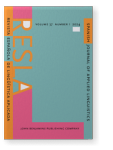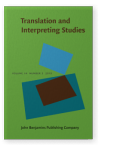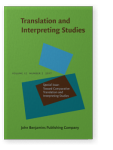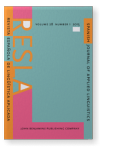Xiangdong Li
List of John Benjamins publications for which Xiangdong Li plays a role.
2024 Teaching listening for interpreting through mind mapping: Students’ attitudes and its effectiveness Revista Española de Lingüística Aplicada/Spanish Journal of Applied Linguistics 37:1, pp. 172–199 | Article
Interpreting scholars claim that mind mapping can be used pedagogically to enhance trainees’ interpreting-specific listening skills. However, so far relevant empirical studies have been rare. A single-group post and retrospective self-assessment design was used to examine student interpreters’… read more
2023 Global, glocal or local? The construction of a new identity by peripheral social sciences and humanities journals through translation-mediated bilingual publishing Language Problems and Language Planning 47:3, pp. 233–255 | Article
Local (peripheral) social sciences and humanities journals are underrepresented in major indexes due to linguistic, ideological, and disciplinary bias. To seek international visibility without sacrificing their local identity, they are adopting translation-mediated bilingual publishing to… read more
2019 Analyzing translation and interpreting textbooks: A pilot survey of business interpreting textbooks Translation and Interpreting Studies 14:3, pp. 392–415 | Article
Textbooks are a significant source of knowledge and a major factor in shaping teaching and learning; however, textbook analysis has been a neglected area of research. This pilot study examines the coverage of business interpreting competences and their pedagogical treatment in thirty-two… read more
2017 Translation studies communities in Spain and South Korea: A diachronic comparative study Toward Comparative Translation and Interpreting Studies, Tyulenev, Sergey and Binghan Zheng (eds.), pp. 278–309 | Article
Translation Studies (TS), while being one academic discipline, may develop differently in different regions under the influence of sociocultural contextual factors. TS communities in different societies may have different research foci and standards. However, to date, there has been little… read more
2015 Designing a sight translation course for undergraduate T&I students: From context definition to course organization Revista Española de Lingüística Aplicada/Spanish Journal of Applied Linguistics 28:1, pp. 169–198 | Article
Sight translation is widely used in the T&I classroom as a pedagogical tool to enhance trainees’ acquisition of interpreting skills and as a communicative tool to prepare trainees for the translation market. Sight translation, as a separate course, or at least as a necessary component of an… read more
2015 Putting interpreting strategies in their place: Justifications for teaching strategies in interpreter training Babel 61:2, pp. 170–192 | Article
The term strategy is increasingly mentioned in the interpreting literature. Individual strategies have been approached from various perspectives by a number of interpreting research scholars. Those strategies are used by interpreters to cope with cognitive constraints, interpreting mode-specific… read more





